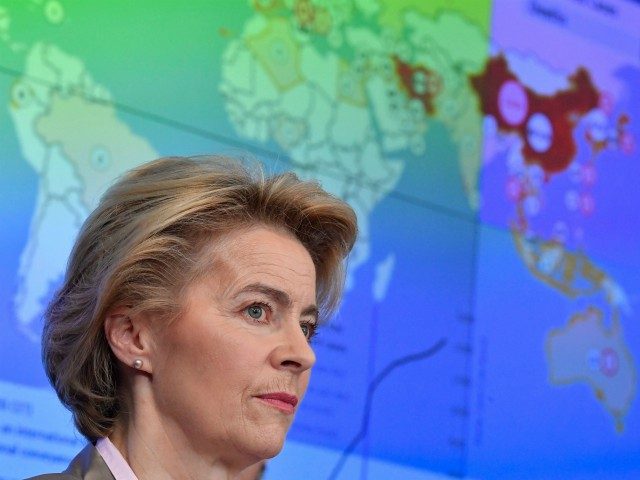The president of the European Commission has recommended member states enact entry restrictions to the European Union for 30 days due to the coronavirus pandemic.
Ursula von der Leyen made the proposal on Monday, saying: “As I have just informed our G7 partners, I propose to the heads of state and government to introduce a temporary restriction on non-essential travel to the European Union. These travel restrictions should be in place for an initial period of 30 days, which can be prolonged as necessary.”
The four non-EU members of the Schengen visa-free zone — Norway, Iceland, Switzerland, and Lichtenstein — were also asked to enact travel restrictions.
Mrs von der Leyen outlined exemptions, including long-term residents of the EU and family members of EU nationals, people transporting goods, “frontier workers” who travel from other non-EU countries to work, and diplomats. Essential medical and scientific researchers working on fighting the virus are also encouraged to continue to come to the European Union.
However, these are, at best, recommendations as ultimately it is the 27-member states who can decide who can enter their countries. Further, several countries have already enacted strict border controls, the latest being central European state Hungary and the home nation of von der Leyen, Germany.
The European powerhouse announced that as of Monday evening, it will close borders with five of its neighbouring countries — Austria, Denmark, France, Luxembourg, and Switzerland — to help halt the spread of the disease across national borders.
Commission President von der Leyen, however, did not call for the halt to the internal movement of people within the bloc. On Sunday, she had said that “protecting people’s health” should not result in blocking goods and the movement of “essential staff” across the bloc, and that Free Movement must be maintained to “keep our internal market going”.
Still reluctant to recommend countries self-isolate to lessen the spread of the virus, the European Commission, however, told the EU27 on Monday that “Member States may reintroduce internal border controls for reasons of public policy, which, in extremely critical situations, may include public health.”
The announcement came after an emergency meeting of the G7 via videoconference to discuss the global responses to COVID-19 which was announced on Friday. The emergency meeting — comprised of the United States, United Kingdom, France, Germany, Italy, Canada, and Japan with the EU as an ‘eighth’ member — came after U.S. President Donald Trump had banned entry to foreign travellers from the Schengen Zone.
President Trump had said: “The European Union failed to take the same precautions and restrict travel from China and other hotspots… As a result, a large number of new clusters in the United States were seeded by travelers from Europe.”
The President had initially exempted the United Kingdom and the Republic of Ireland from the ban, as neither are in Schengen, but both have since been added to the ban.
Despite criticisms over the handling of coronavirus, the UK has not as yet enacted similar entry bans to those of either the U.S. or even EU. Boris Johnson’s transport minister appeared to criticise other countries’ decision to lock down their borders, with Grant Shapps telling Sky News on Monday: “We are just being entirely science-led, we’re not doing the things that are happening elsewhere just because it seems like a popularist [sic] thing to do.”

COMMENTS
Please let us know if you're having issues with commenting.